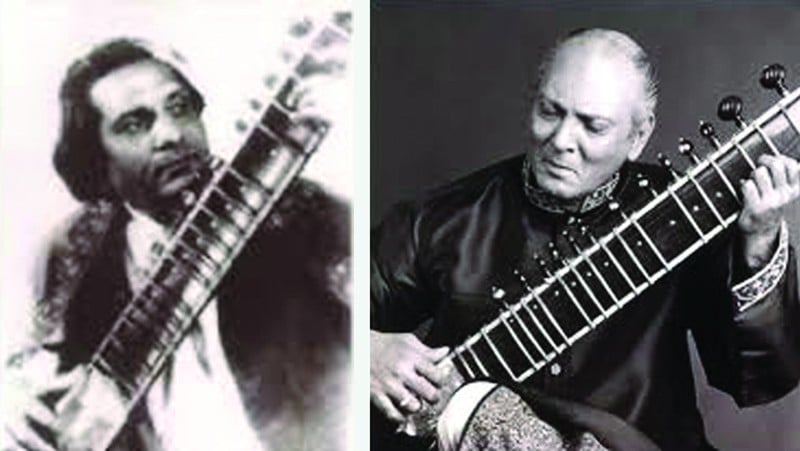
Sitar players who lived and died in Pakistan and made their mark

The barsi of Ustad Shareef Khan is a good occasion to remember some of the other sitar players who lived and died in Pakistan and also the general condition of sitar playing in the country.
Ustad Kabir Khan who was born in Rajasthan also migrated to Pakistan and lived all his life till his death in 1990 in Karachi. After his initial training from his father Ameer Khan and then from Muhammed Khan, he was considered good enough to teach at Tagore’s Shantiniketan. He used to play the seenia baaj on the sitar and that was rare in Pakistan. He was associated with Radio Pakistan and he broadcast sitar recitals for many years and was also invited to perform live on stage. Such was his stature that he was invited to play at the wedding of Prince Karim Aga Khan.
Ustad Fateh Ali Khan too migrated to Pakistan. His grandfather Ameer Ali who was the shagird of Syed Nasir Ahmed belonged to the Kapurthala Gharana which had carved out an identity of its own due to a mixture of dhrupad and Sikh liturgical singing of kirtaan and shabd. It was also highly influenced by the timber of veena. His uncle Bhai Mehboob Ali was also a very good instrumentalist who was also one of the ustads of Bhai Lal Muhammed He used to play the maseet khaani baaj.
Fateh Ali Khan joined the orchestra of Master Ghulam Haider, the music composer and became familiar with the art of film song composition. He ventured forth and did compose music for a few films like Jheel Kinare, Saathi and Bedari but since his heart lay in the playing of the sitar, he quit the films, left Lahore, settled in Rawalpindi and became associated with the Radio there.
Ustad Shareef Khan too played for years in the orchestras that were meant to accompany film song. The programmes on radio, stage and private concerts were not enough to sustain even a frugal lifestyle and he was forced to play interval pieces for many of the music directors including Khursheed Anwar.
The most outstanding sitar player in the country at present is Ustad Raees Khan. After having spent the formative years in India, in the decade of the 1980s at the prime of his career he moved and set up home here. He has lived since mostly in Karachi. Like most Muslim musicians, Ustad Rasees Khan’s family too was divided at partition in 1947. Due to circumstances and the state of relations between the two countries, travelling in private capacity became difficult while to perform in public was made almost impossible due to the various clearances that one had to get for the purpose. Many artists did come to Pakistan to visit relatives, attend a wedding or a funeral but were held back from performing in public.
Given the stature of Raees Khan and his great skill with the instrument he has not performed as he should have, nor did his presence create the impact that was so badly needed for the resuscitation of classical music in the country. The positive aspect is that he has prepared his son Farhan Khan and hopefully he will venture out to perform on his own in the years to come.
Of the many sons of Ustad Fateh Ali Khan, Nafees Khan has been consistent with the playing of the sitar. He has stayed back in the country and after many years in Rawalpindi he now lives in Karachi where he teaches music at the National Academy of Performing Arts. He also could not live exclusively on playing the sitar full time so he diversified his talent by appearing in television programmes as an accompanist to the vocalists, and also lent his skill for background scores in plays, ads and stage shows. Given a chance, he displays his immense talent and virtuosity in playing classical raags on the sitar.
Ashraf Shareef Khan left the country about twenty years ago for Germany and he visits at least once a year. He plays the classical sitar but is also part of the group that is more into contemporary music. He has visited Pakistan with that group as well to give us a fair idea of what he has been doing all these years that he was away.
Sitar as an instrument was given recognition internationally by the likes of Ravi Shanker in the decade of the 1950s and then very soon it assumed the status of a cult instrument, if this expression can be used for an instrument and not a person or a movement. And as it has happened so many times in the subcontinent, the recognition by the West is taken as almost divine sanction to embrace something that is our very own. Sitar then became the symbol of culture and in Pakistan these cultural types who spared no moment in emulating cultural practices, icons and cults of bigger powers took to forcing their children, boys and girls to become sitar players not with a truly professional intent but only to acquire a social grace.
That fad has now passed in both India and Pakistan. In our country now other than guitar the electric keyboard in the most popular instrument which is used for all kinds of purposes, accompaniment to the composition of music.
Many sitar players died known only within their limited circle like Alam Khan, Muzzafar Akbar Khan, Abdur Rasheed Khan and Iqbal Awan. A few are still playing like Latif Khan, Salim Khan, Kafeel Awan and Rake Jamil with great determination. Turaab Ali from Karachi is a very talented sitar player and if he has the required tenacity to withstand the slings and arrows of wants, lack of appreciation and limited opportunities, he will become an outstanding sitar player.